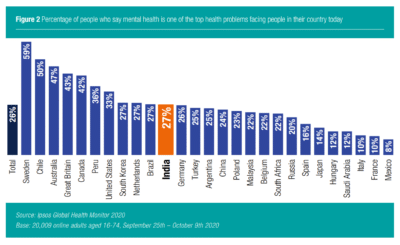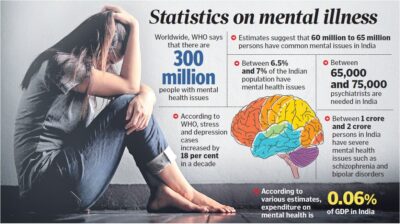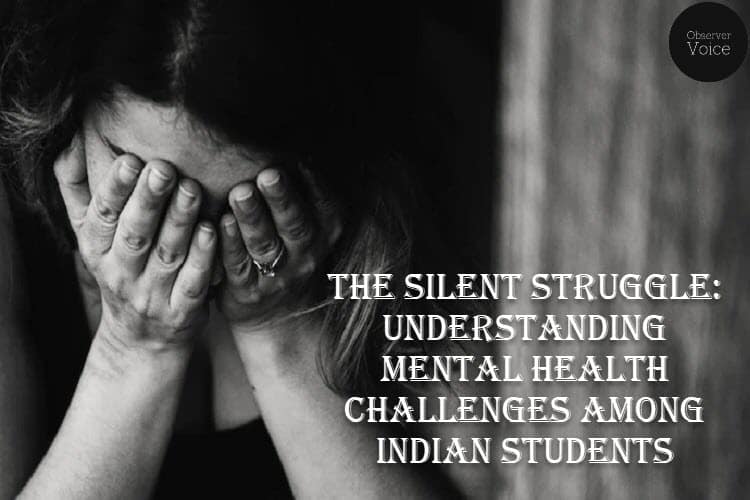Today one out of every seven children in India is going through depression. What is its region and what difference does it make to us by knowing it?
Mental health is an important issue affecting many individuals worldwide. In India, mental health issues are particularly prevalent among students. The pressure to excel academically and fulfill societal expectations often leads to stress, anxiety, and depression. In this article, we will be Understanding Mental Health Challenges Among Indian Students.
Main regions emerged for mental health issues
Data says that one out of seven children in India has to face mental health issues. Depression, anxiety, ADHD, and even schizophrenia where kids have hallucinations. Can you guess how many of those children have medical support? It’s less than 1%. Because we don’t talk openly about mental health in India.
Children Friend’s don’t have the capacity to understand and elders don’t show the desire to understand, which results in a person ending up feeling Suffocated. Studies say that depression and anxiety have a different impact on our digestive process, which increases the chances of diabetes in the future.

Image Source: www.weforum.org
UNICEF spoke to the children of India and three main regions emerged for mental health issues.
Unhealthy Competition in School Days: Its Effects and Solutions
Competition can be healthy, motivating students to strive for excellence and achieve their goals. However, when competition becomes unhealthy, it can lead to stress, anxiety, and other negative outcomes. Unfortunately, unhealthy competition is a common phenomenon in schools, where students are under immense pressure to perform well academically and socially.
But the shocking thing is that earlier this comparison was limited only to the class, cousins, brothers, and sisters, and there was competition in a small circle. But today when we are told from such news that all the parents think that the child gets hundred percent marks if it is possible for him then why not for my child?
Effects of Unhealthy Competition in School:
- High levels of stress and anxiety: Unhealthy competition can create an atmosphere of high stress and anxiety among students. Students may feel pressure to outperform their peers, leading to constant worry and fear of failure.
- Low self-esteem: When students feel like they are constantly being compared to their peers, it can lead to a lack of self-confidence and low self-esteem. Students may feel like they are not good enough or that they are constantly falling behind their peers.
- Negative behavior: Unhealthy competition can lead to negative behavior such as cheating, lying, and sabotage. Students may resort to these behaviors in an attempt to gain an advantage over their peers.
- Decreased creativity: Unhealthy competition can stifle creativity as students focus solely on achieving high grades and outperforming their peers rather than exploring their interests and passions.
Read More: World Mental Health Day
Solutions to Unhealthy Competition in School:
- Encourage collaboration: Encouraging collaboration and teamwork can shift the focus from competition to cooperation. Group projects and activities can help students learn how to work together and appreciate each other’s strengths.
- Celebrate diversity: Every student is unique, with their own set of strengths and weaknesses. Celebrating diversity can help students appreciate each other’s differences and foster an inclusive environment where everyone feels valued.
- Promote a growth mindset: Promoting a growth mindset can help students view failure as an opportunity to learn and grow rather than a reflection of their worth. Encouraging students to take risks and learn from their mistakes can help them develop resilience and perseverance.
- Emphasize well-being: Emphasizing well-being can help students prioritize their physical and mental health over academic performance. Encouraging students to take breaks, exercise, and practice self-care can help reduce stress and promote a healthier learning environment.
It is very important for parents to understand that we all are running different races. What can we do if our starting line is different from the finish line? Stop treating kids like trophies. If a comparison has to be done, then it can be done with the input as well as with the output. Parents can create an environment for their children that is best for their growth and prosperity.

Image Source: InsightsIAS
Social Media & Anxiety
The phone has now become a Weapon of Mass Destruction. Kids have to focus on their phones while in online classes and later stay away from the phone while studying. Because of this problem, a lot of confusing signals have worked for the children and passed the time. There is no distinction between work and play.
Dopamine is called the feel-good hormone and it is very important to have the right balance of both in our body. But social media gives us an instant boost of dopamine which can get extremely addictive.
Paul Phillips and his colleagues at the University of North Carolina surgically outfitted rats with newly developed brain electrodes that recorded dopamine levels 10 times a second — 200 times faster than earlier technology permitted.
The Impact of social media on Depression and Anxiety:
- Comparison and self-esteem: Social media can create an atmosphere of constant comparison, with users comparing their lives to those of their friends and acquaintances. This can lead to feelings of inadequacy, low self-esteem, and depression.
- Cyberbullying: Social media can also be a platform for cyberbullying, which can have devastating effects on mental health. Cyberbullying can lead to anxiety, depression, and even suicide in extreme cases.
- FOMO: Fear of missing out (FOMO) is another phenomenon associated with social media use. When users see their friends having fun and socializing without them, it can lead to feelings of loneliness, anxiety, and depression.
- Sleep problems: Social media use can interfere with sleep patterns, leading to insomnia and other sleep disorders. Lack of sleep can exacerbate symptoms of depression and anxiety.
Mitigating the Negative Effects of Social media on Depression and Anxiety:
- Limit social media use: Limiting social media use can help reduce the negative effects of social media on mental health. Users should consider setting boundaries for themselves and limit the time they spend on social media platforms.
- Seek social support: Social support is essential for maintaining good mental health. Users should seek out social support from friends and family members offline, rather than relying solely on social media for connection and support.
- Practice self-care: Practicing self-care can help reduce symptoms of depression and anxiety. Users should prioritize activities that promote mental and physical well-being, such as exercise, mindfulness, and healthy eating.
- Be mindful of online interactions: Users should be mindful of their online interactions and avoid engaging in negative or toxic conversations. They should also report and block any cyberbullying behavior they encounter.
Impact of Lockdown on Mental Health
The COVID-19 pandemic and the associated lockdowns have had a significant impact on mental health, particularly among students. 58% of Indian college students reported an increase in stress and severe deterioration in their emotions of anger, anxiety, loneliness, hopelessness, and happiness.
According to a study published in the Asian Journal of Psychiatry, over 53% of Indian university students suffer from moderate to extremely severe depression.
The Impact of Lockdown on the Mental Health of Students:
- Isolation and loneliness: Lockdowns and social distancing measures can lead to feelings of isolation and loneliness, particularly for students who are unable to connect with their friends and classmates in person.
- Anxiety and stress: The uncertainty and fear surrounding the pandemic can lead to increased levels of anxiety and stress, particularly for students who are worried about their academic progress and future prospects.
- Disruption of routines: Lockdowns have disrupted daily routines, which can lead to feelings of disorientation and stress. This is particularly true for students who are used to a structured routine, such as attending classes and participating in extracurricular activities.
- Technology overload: With remote learning becoming the norm, students are spending more time in front of screens than ever before. This can lead to eye strain, headaches, and other physical symptoms, as well as fatigue and mental exhaustion.
Mitigating the Negative Effects of Lockdown on the Mental Health of Students:
- Stay connected: Students should stay connected with their friends and classmates, whether through video chats, social media, or other means. This can help reduce feelings of isolation and loneliness.
- Establish a routine: Establishing a routine can help create a sense of normalcy and reduce feelings of stress and anxiety. This includes setting a regular sleep schedule, taking regular breaks from technology, and incorporating exercise and other activities into daily routines.
- Practice self-care: Practicing self-care can help reduce symptoms of depression and anxiety. This includes activities such as exercise, mindfulness, and engaging in hobbies and other leisure activities.
- Seek academic and emotional support: Students should seek academic and emotional support from their teachers, counselors, or other professionals if they are struggling with their coursework or mental health.
List of Websites for Mental Health Support in India
Here are some websites for mental health support in India:
- The National Institute of Mental Health and Neurosciences (NIMHANS) – https://www.nimhans.ac.in/
- Vandrevala Foundation – https://www.vandrevalafoundation.com/
- YourDOST – https://yourdost.com/
- iCALL – https://www.icallhelpline.org/
- The Live Love Laugh Foundation – https://www.thelivelovelaughfoundation.org/
- Sneha India Foundation – http://www.snehaindia.org/
- The Health Collective – https://www.healthcollective.in/
- The Banyan – https://thebanyan.org/
- Sangath – https://www.sangath.com/
- Indian Psychiatric Society – https://indianpsychiatricsociety.org/
These websites provide a range of mental health resources and services, including counseling, therapy, support groups, and information on mental health conditions and treatment options. It is important to note that seeking help from a mental health professional is a personal decision, and individuals should choose a service that best suits their needs and preferences.

